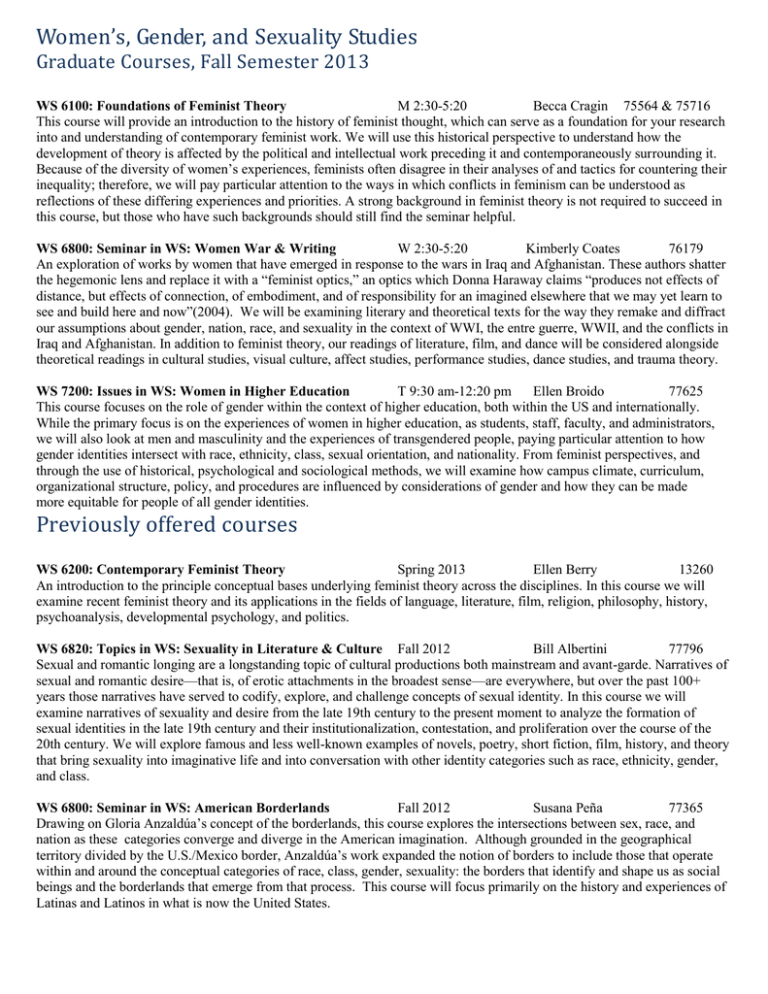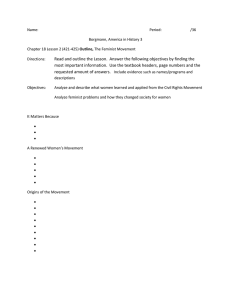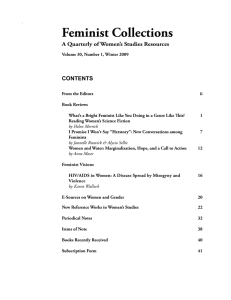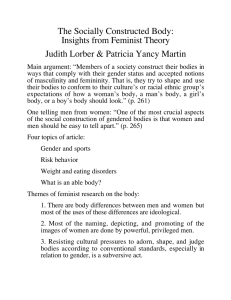Fall 2013 Course Flyer
advertisement

Women’s, Gender, and Sexuality Studies Graduate Courses, Fall Semester 2013 WS 6100: Foundations of Feminist Theory M 2:30-5:20 Becca Cragin 75564 & 75716 This course will provide an introduction to the history of feminist thought, which can serve as a foundation for your research into and understanding of contemporary feminist work. We will use this historical perspective to understand how the development of theory is affected by the political and intellectual work preceding it and contemporaneously surrounding it. Because of the diversity of women’s experiences, feminists often disagree in their analyses of and tactics for countering their inequality; therefore, we will pay particular attention to the ways in which conflicts in feminism can be understood as reflections of these differing experiences and priorities. A strong background in feminist theory is not required to succeed in this course, but those who have such backgrounds should still find the seminar helpful. WS 6800: Seminar in WS: Women War & Writing W 2:30-5:20 Kimberly Coates 76179 An exploration of works by women that have emerged in response to the wars in Iraq and Afghanistan. These authors shatter the hegemonic lens and replace it with a “feminist optics,” an optics which Donna Haraway claims “produces not effects of distance, but effects of connection, of embodiment, and of responsibility for an imagined elsewhere that we may yet learn to see and build here and now”(2004). We will be examining literary and theoretical texts for the way they remake and diffract our assumptions about gender, nation, race, and sexuality in the context of WWI, the entre guerre, WWII, and the conflicts in Iraq and Afghanistan. In addition to feminist theory, our readings of literature, film, and dance will be considered alongside theoretical readings in cultural studies, visual culture, affect studies, performance studies, dance studies, and trauma theory. WS 7200: Issues in WS: Women in Higher Education T 9:30 am-12:20 pm Ellen Broido 77625 This course focuses on the role of gender within the context of higher education, both within the US and internationally. While the primary focus is on the experiences of women in higher education, as students, staff, faculty, and administrators, we will also look at men and masculinity and the experiences of transgendered people, paying particular attention to how gender identities intersect with race, ethnicity, class, sexual orientation, and nationality. From feminist perspectives, and through the use of historical, psychological and sociological methods, we will examine how campus climate, curriculum, organizational structure, policy, and procedures are influenced by considerations of gender and how they can be made more equitable for people of all gender identities. Previously offered courses WS 6200: Contemporary Feminist Theory Spring 2013 Ellen Berry 13260 An introduction to the principle conceptual bases underlying feminist theory across the disciplines. In this course we will examine recent feminist theory and its applications in the fields of language, literature, film, religion, philosophy, history, psychoanalysis, developmental psychology, and politics. WS 6820: Topics in WS: Sexuality in Literature & Culture Fall 2012 Bill Albertini 77796 Sexual and romantic longing are a longstanding topic of cultural productions both mainstream and avant-garde. Narratives of sexual and romantic desire—that is, of erotic attachments in the broadest sense—are everywhere, but over the past 100+ years those narratives have served to codify, explore, and challenge concepts of sexual identity. In this course we will examine narratives of sexuality and desire from the late 19th century to the present moment to analyze the formation of sexual identities in the late 19th century and their institutionalization, contestation, and proliferation over the course of the 20th century. We will explore famous and less well-known examples of novels, poetry, short fiction, film, history, and theory that bring sexuality into imaginative life and into conversation with other identity categories such as race, ethnicity, gender, and class. WS 6800: Seminar in WS: American Borderlands Fall 2012 Susana Peña 77365 Drawing on Gloria Anzaldúa’s concept of the borderlands, this course explores the intersections between sex, race, and nation as these categories converge and diverge in the American imagination. Although grounded in the geographical territory divided by the U.S./Mexico border, Anzaldúa’s work expanded the notion of borders to include those that operate within and around the conceptual categories of race, class, gender, sexuality: the borders that identify and shape us as social beings and the borderlands that emerge from that process. This course will focus primarily on the history and experiences of Latinas and Latinos in what is now the United States.



